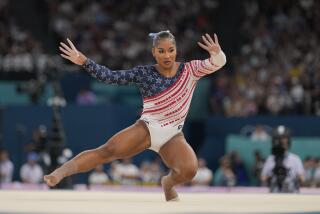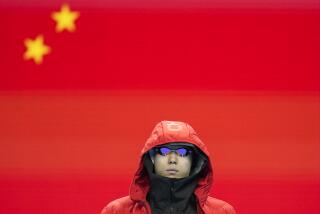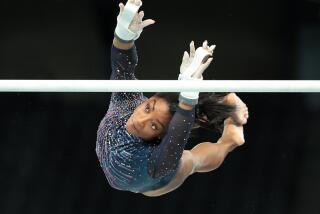IOC asks panel to revisit 3 Chinese gymnasts’ ages
- Share via
BEIJING — The International Olympic Committee today asked the international gymnastics federation to reexamine whether gold-medal-winning gymnast He Kexin and two of her teammates were too young to compete in the Beijing Games.
“You shouldn’t regard this as a formal investigation, but we have asked the international gymnastics federation to look into a number of questions and discrepancies on these cases,” IOC spokeswoman Giselle Davies said. “We have been working with the [Chinese] national federation to really have a full clarification on this topic. We did discuss it earlier in the Games, and we believed we had addressed the issue.”
In the Olympics, a gymnast must turn 16 during the year the Games are held.
If He is determined to be too young, she would be stripped of her medals. In the uneven bars competition Monday, she narrowly beat Nastia Liukin of the United States for the gold. She also has a team gold medal.
It is also possible that all of the Chinese women could be stripped of their team gold medals.
The decision to further look into the allegations comes after a series of articles, most recently by the Times of London, said that documents from Chinese sports agencies that had been posted on the Internet showed He is not 16. The British article was based on a Web report by a computer security expert who said he had obtained the documents.
Among those documents are gymnastics registration lists showing that He was born Jan. 1, 1994, though the passport China submitted for Olympic entry listed her birth date as Jan. 1, 1992.
Some of these online documents were the basis of articles last month in the New York Times and the Los Angeles Times raising questions about the ages of Chinese athletes, including He.
Several of these documents and stories have since been deleted from websites, including a Chinese news agency report in November that quoted a Chinese sports federation official as saying that He was 13 and a 2012 Olympic prospect.
He was reported to have started her training at the Ditan Sports School in Beijing in 1997 when she was either 3 or 5 years old.
“I don’t know who is her mother,” said Shang Chunyan, who trained He for three years at Ditan. Shang refused to talk about He’s age, referring questions to officials with the Dongcheng District of Beijing, which oversees the school.
Some accounts say He’s mother is an employee in the psychological research unit of the elite Chinese Academy of Sciences in Beijing. Bulletin board postings list her mother’s name as Yang Xiaoyan. The academy said Yang was on vacation and could not be reached for comment.
Wang Wei of the Chinese Olympic committee said the matter of athletes’ ages was looked into and the athletes in question had been cleared to compete.
“Eligibility has already been investigated by authorities in the international federation,” Wang said. “If the athletes hadn’t been cleared, they wouldn’t have participated.”
U.S. officials welcomed the news of the inquiry.
“USA Gymnastics has always believed this issue needed to be addressed by the FIG [the international gymnastics federation] and IOC,” said Steve Penny, president of USA Gymnastics. “An investigation would help bring closure to the issue and remove any cloud of speculation from this competition.”
In addition, documents obtained by the Los Angeles Times gave ages of 13 or 14 for gymnasts Yang Yilin and Jiang Yuyuan as recently as last fall.
When the Chinese gymnastics federation turned in passports to FIG, He’s age was listed as 16. On the documents, Yang and Jiang also had varying birthdays.
FIG spokesmen insisted throughout the gymnastics competition that it was not the federation’s job to be investigators and that as long as a country was able to issue a valid passport for an athlete, FIG would do no further checking.
Among Chinese sports fans on the Web, there is a vigorous debate about not only the gymnasts’ age but also the ethics of lying.
One writer on a popular Tianya news site accused the Western media of “making a fuss to demonize China,” but most contributors expressed the desire to have the gymnasts’ true age revealed.
“I hope my country will win gold medals, but the rest of the world must be convinced,” wrote one contributor.
Another wrote, “Fake medals represent true shame.”
--
barbara.demick@latimes.com
More to Read
Go beyond the scoreboard
Get the latest on L.A.'s teams in the daily Sports Report newsletter.
You may occasionally receive promotional content from the Los Angeles Times.






